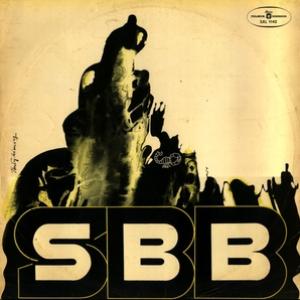SBB
by SBB

Artist:
SBB
Label:
Polskie Nagrania Muza
Catalog#:
SXL 1142
Format:
Vinyl
Country:
Poland
Released:
1974
| Tracklist | |||
| A | Odlot | 19:20 | |
| B | Wizje | 19:00 | |
Credits
Bass, Electric Piano, Music By, Synthesizer, Vocals - Józef Skrzek
Guitar - Apostolis Antymos
Percussion - Jerzy Piotrowski
Strawberry Bricks Entry:
Hailing from Poland, SBB was first known as the Silesian Blues Band, and later adopted the more political "Szukaj, Burz, Buduj" (Polish for "Search, Breakup, Build"). Formed in 1971 in Siemianowice, Upper Silesia by bassist Józef Skrzek with Antymos Apostolis (confusingly aka Apostolis Anthimos) on guitar and Jerzy Piotrowski on drums, the band was adopted by popular singer and organist Czeslaw Niemen as his backing band. Niemen recorded three albums in English for the CBS label, beginning with Strange Is This World in 1970. A mix of heavy blues, passionate vocals and organ, it was followed up by another heady mix of the progressive rock in 1973, Ode To Venus, before SBB broke off on their own in early 1974. Immediately a best-seller, SBB's self-titled debut is a live recording from a club in Warszawa. Released by Poland's national record label, Muza, the album reveals a mighty powerful group. Two sprawling jams cover each side of the record; free form, yet rooted in heavy rock, Anthimos also reveals himself as one electrifying guitarist. Skrzek switches between bass and organ, while Piotrowski provides a constant driving rhythm. The band's next album, 1975's career-defining Nowy Horyzont ("New Horizon"), ventures further into the realms of the Mahavishnu Orchestra, as well as adding symphonic touches to their sound-often interrupted by Skrzek's solo piano vignettes. Touring throughout Europe, the band was in their element playing live, and without a doubt, SBB was a world-class group. Two more albums appeared for Muza: Pamiec ("Memory") followed in 1976, and Ze Slowem Biegne Do Ciebie ("With the Word I Run To You") in 1977; with Skrzek incorporating diverse keyboards, both furthered the band's evolving long-form progressive rock. Yet by 1978, SBB began to look outside Poland's borders; first recording for the East German Amiga and Czech Supraphon labels, and later for the German Spiegelei label; the albums saw further reliance of vocals, and a move to more marketable sound. However, after a final album in 1980, SBB was no more, though their legacy stands as Poland's greatest musical export.

